Media

A Revolving Door of Corruption
The revolving door of politics—when top government officials change careers and become consultants for the industry they once regulated—is alive and well in Pennsylvania. Except in the case of the commonwealth’s Liquor Control Board (LCB), the revolving door involves regulators who were previously cited for improperly accepting gifts and other forms of outright corruption.
Kari Andren of the Tribune Review has the story of formerly sanctioned LCB officials now representing the wine and spirits industry before the LCB:
From January through mid-September, the former officials — and vendors who provided the gifts — collectively visited LCB offices more than 120 times, according to visitor logs for the Northwest Office Building in Harrisburg, obtained under the state's Right to Know Law.
The logs show:
• [Matt] Schwenk, now a spirits sales representative for Palm Bay International, visited LCB officials six times, typically in the product selection division. Palm Bay imports dozens of brands of wines and spirits. Schwenk was cited by the state Ethics Commission in 2014 for taking gifts of golf outings and trips from vendors.
• Former CEO Joe Conti, who accepted golf outings, dinners and gifts from vendors, attended board meetings and met with LCB attorneys and board Chairman Tim Holden. He's a registered lobbyist who counts among his clients Majestic Wine and Spirits, which distributed all but one of the LCB's controversial in-house brands of wines and spirits, and the United Food and Commercial Workers union representing liquor store clerks.
• Former LCB Chairman Patrick “P.J.” Stapleton, who accepted rounds of golf, meals and Philadelphia Phillies tickets, has made three trips to the agency. He is a partner at the law firm Weber Gallagher in Philadelphia, where his biography notes that he has represented alcohol suppliers regarding recent changes to the state liquor code.
As Andren explains, sanctions against LCB officials are not roadblocks for these same individuals to gain lucrative employment in the alcohol industry. This lack of accountability could explain why LCB officials hindered the release of information that, according to Pennsylvania’s open record law, should be matter of public record. Why follow the law when there are no consequences?
My CF colleague Dawn Toguchi said it best: You can’t spell corruption without L-C-B. The state's monopoly over the wine and spirits industry has produced numerous scandals on top of its shoddy service and uncompetitive prices.
Now add the revolving door of corruption to the endless list of reasons to get the government out of the alcohol business, once and for all.